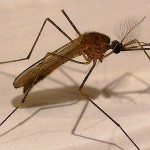 Developers of the vaccine are trying to get it universally approved because it could help protect millions of young children.
Developers of the vaccine are trying to get it universally approved because it could help protect millions of young children.
The world’s first malaria vaccine is only partially effective but could shield millions of young children against the deadly parasites, according to researchers.
Final study results of the GlaxoSmithKline vaccine, published today in The Lancet medical journal, showed it protects about one-third of children vaccinated.
The World Health Organisation (WHO) had previously set a target of 2015 for having a malaria vaccine that was at least 50% effective with protection lasting longer than a year.
Those goals have been missed with the new vaccine, known as RTS,S, but scientists claim a breakthrough.
“Everyone accepts that this is not the perfect or the last malaria vaccine,” said Brian Greenwood of the London School of Hygiene and Tropical Medicine, the study’s lead author.
“It’s not good enough to stop transmission but it will cut the huge burden of disease.”
He noted there are about 200 million cases of malaria every year, with many children infected multiple times.
“Preventing some of those attacks is not insignificant,” he said.
The vaccine study involved about 15,500 babies and toddlers in Africa; one group got three doses; a second group also got a booster shot and a third group got dummy shots. All of the children used a mosquito bed net and they were followed for up to four years.
Overall, the vaccine was about 30% effective in those who got three doses and a booster shot but the protection waned over time.
It worked a little better – about 36% – in those five months to 17 months. But it was only 26% effective in babies and vaccination made no difference in the rates of severe malaria or deaths.
More commonly used vaccines, like those for measles and polio, work more than 90% of the time.
Researchers reported side effects including pain, fever and convulsions. There were also 22 cases of meningitis in babies and toddlers who were immunised compared to one case in the group that didn’t, but the researchers couldn’t explain why.
Mr Greenwood said the vaccine would likely be made available at cost and that major funders have already expressed interest in paying for immunisation campaigns.
Other experimental malaria vaccines are being developed but are at least several years behind.
WHO estimates malaria killed more than 580,000 people in 2013, mostly children in Africa under age five.
“This vaccine could mean children will have only two bouts of malaria a year instead of five,” said Dr Martin De Smet, a malaria expert at Doctors Without Borders, who was not connected to the study.
He said convincing parents to get their children vaccinated several times might be a tough sell.
“They know their child will probably get some malaria despite the vaccination, so how enthusiastic are they going to be?”
The WHO will meet in October to consider how the vaccine might be used.
Source Sky News

















